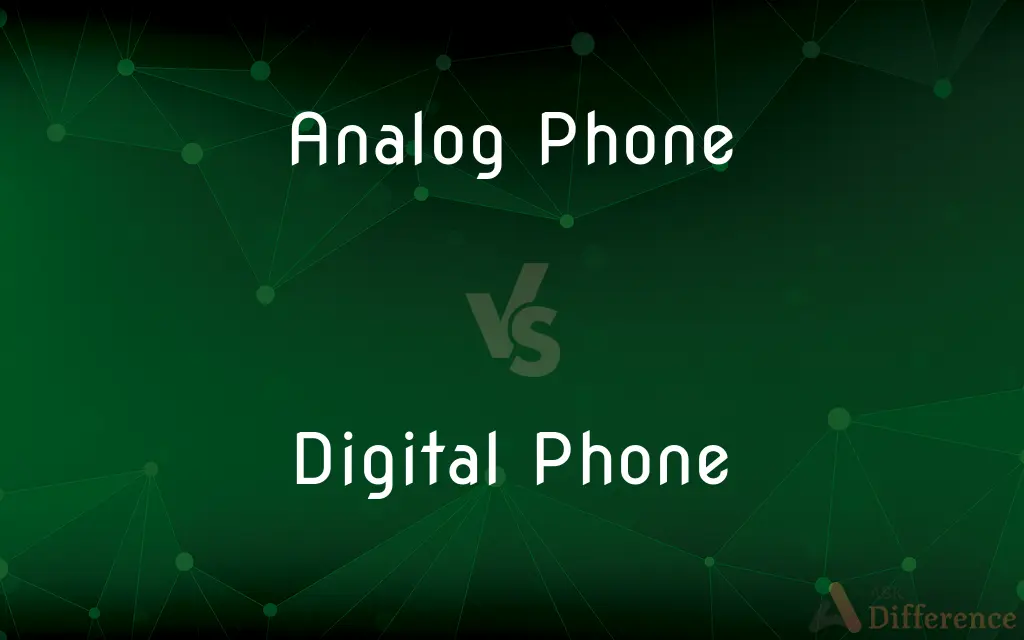Analog Phone vs. Digital Phone — What's the Difference?
By Tayyaba Rehman — Published on November 28, 2023
Analog phones transmit voice as electrical signals, while digital phones convert voice into binary data for transmission. The former often uses traditional landlines, while the latter encompasses VoIP and cellular technologies.

Difference Between Analog Phone and Digital Phone
Table of Contents
ADVERTISEMENT
Key Differences
Analog phones and digital phones, at their core, are devices utilized for audio communication over distances. However, they process and transmit voice signals in distinctly different ways, contributing to variations in sound quality, functionality, and technological application.
Analog phones, classic and somewhat nostalgic, transmit voice by converting it into electrical signals which travel over copper lines. This technology, while historically significant, can experience interference and potential degradation of call quality due to physical disturbances or line length.
Conversely, digital phones convert voice communication into binary (digital data), which is transmitted and then converted back into sound at the receiving end. This method, primarily used in cellular and VoIP communication, typically delivers clearer, crisper voice quality, and can efficiently integrate with modern technology.
Analog phones, often limited to basic features like dialing and voice mail, have been a standard for decades, especially in residential settings. This simplicity and reliability have cemented them in various applications, despite the rise of digital alternatives.
On the other hand, digital phones can offer advanced features like call forwarding, conference calling, and integration with computers and smartphones. Their compatibility with digital data enables them to natively manage various forms of information, crafting a versatile communication tool in contemporary contexts.
ADVERTISEMENT
Comparison Chart
Signal Transmission
Transmits voice as electrical signals
Converts voice into binary data for transmission
Technology Basis
Primarily uses copper line transmission
Utilizes digital data networks, including cellular and IP networks
Sound Quality
Can degrade over distance/interference
Typically clearer and crisper
Feature Set
Generally limited to basic functions
Can offer advanced features and integrations
Technological Integration
Limited integration with modern tech
Easily integrated with various digital technologies
Compare with Definitions
Analog Phone
Utilizes electrical signals to transmit voice.
The analog phone, once a household staple, used electrical signals to facilitate communication.
Digital Phone
Offers a suite of advanced features and integrations.
The digital phone on my desk allows me to forward calls to my mobile seamlessly.
Analog Phone
Primarily operates over traditional copper lines.
Analog phones often encounter disruptions due to issues with their reliant copper lines.
Digital Phone
Transmits voice by converting it to digital data.
A digital phone ensures clarity by transmitting voice as binary data.
Analog Phone
Subject to interference and quality loss.
An analog phone may exhibit static or reduced clarity over long distances.
Digital Phone
Integrates natively with modern digital technologies.
Digital phones facilitate easy collaboration with technologies like computers and smart devices.
Analog Phone
Historically widespread and commonly recognized.
The ring of an analog phone was once a ubiquitous sound in homes worldwide.
Digital Phone
Capable of maintaining high-quality voice transmission.
Business conferences often rely on digital phones for crisp communication.
Analog Phone
Generally limited to fundamental telephonic features.
Users of analog phones might miss the lack of features like digital voicemail or caller ID.
Digital Phone
Compatible with various digital networks, including cellular and IP.
Digital phones are prevalent due to their adaptability to numerous network infrastructures.
Common Curiosities
Do digital phones always offer better call quality than analog?
While digital generally offers clearer calls, network strength and quality can influence this.
Is it expensive to switch from an analog to a digital phone system?
Costs can vary based on system choice, required hardware, and installation complexity.
Can I use an analog phone on a digital network?
With specific adapters or interfaces, an analog phone can function on digital networks.
How does weather affect analog phone signals?
Severe weather can damage copper lines, affecting signal quality or causing outages.
Can digital phones work with traditional fax machines?
With specific configurations or adapters, digital phones can often work with traditional fax machines.
Are digital phones inherently more secure than analog?
Generally, digital phones can employ encryption and other security protocols that analog cannot.
How durable are analog phones compared to digital?
Analog phones are often praised for their durability but digital phones can also be robust if designed for such.
Why might someone still use an analog phone today?
For its simplicity, reliability, or in locations where digital networks are not accessible.
Can digital phones operate during a power outage?
Some digital phones, especially cordless ones, may not function during power outages without backup power.
Can I have both analog and digital phones in one office?
Yes, with appropriate network configurations, both types can coexist and even interoperate.
How does distance affect analog phone signal quality?
Signal degradation can occur over long distances due to resistance in the copper lines.
What is a primary advantage of digital phones in business contexts?
The ability to integrate with other technologies and data networks, offering advanced features and versatility.
Can I use VoIP services with an analog phone?
Using an Analog Telephone Adapter (ATA), you can convert signals to use VoIP with an analog phone.
Why do analog phones often work during power outages?
Analog phones draw minimal power through the phone line itself, enabling use during outages.
Are digital phones always wireless?
No, digital phones can be either wireless or wired, depending on the specific model and setup.
Share Your Discovery

Previous Comparison
Traditional Commerce vs. E-commerce
Next Comparison
Size vs. Size on DiskAuthor Spotlight
Written by
Tayyaba RehmanTayyaba Rehman is a distinguished writer, currently serving as a primary contributor to askdifference.com. As a researcher in semantics and etymology, Tayyaba's passion for the complexity of languages and their distinctions has found a perfect home on the platform. Tayyaba delves into the intricacies of language, distinguishing between commonly confused words and phrases, thereby providing clarity for readers worldwide.














































